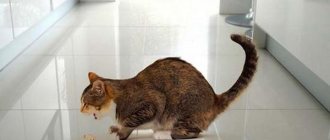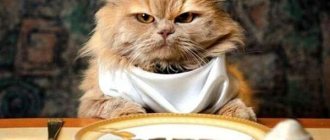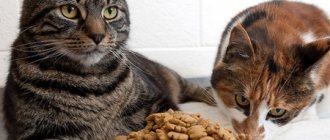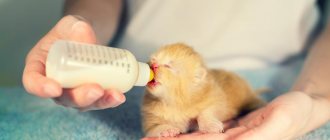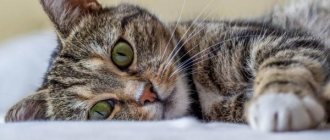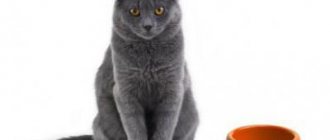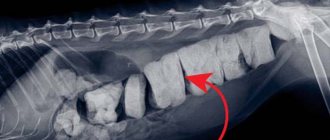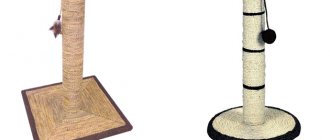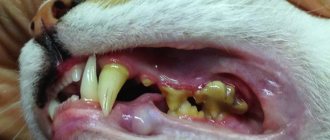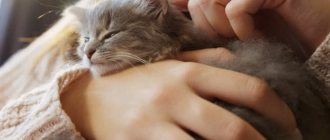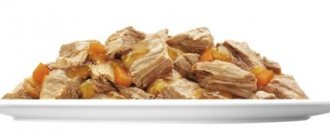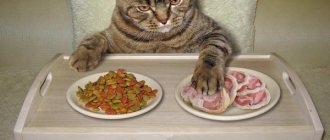Pros and cons of different types of feeding
It is possible to ensure the full functioning of Abyssinian cats by three types of feeding: - natural products; — ready-made dry and canned wet food; - in a combined way, including the previous paragraphs. You can make a choice in favor of one of the types and feed your pet correctly if you know about the characteristics of each of them.
What is included in a natural diet
The very definition of “natural food” evokes a positive response in people. Especially if you add “ecologically friendly nutrition”. When choosing this way to meet the needs of a purebred Abyssinian cat, you will have to learn about all the components of the cat’s, cat’s or kitten’s diet that the animal needs. After all, manufacturers add the necessary additives to ready-made food - this greatly simplifies the tasks of the owners of Abyssinian cats. In uncanned food, the necessary vitamins and microelements may be insufficient or in excess if the same type of food is given.
List of foods that should be given to an Abyssinian cat
A sufficient natural diet means the periodic, proportionally adjusted presence in the menu of the following foods: - dairy products; - cottage cheese (preferably goat's) and/or low-fat sour cream, fermented baked milk, yogurt, but not cow's milk; - boiled or raw (but always frozen!) meat in the form of minced meat or finely chopped product - rabbit, beef (but not veal), lamb are suitable; - boiled poultry (turkey, chicken (not breast); - liver and offal - also frozen, in no case pork; - eggs (eats only boiled yolk, preferably quail, 1-2 times a week); - fish (only sea, since river water contains parasites, as well as many small sharp bones) and fish oil; - a small amount of cereals, sometimes legumes (cooked, but not boiled, include rolled oats, rice, buckwheat, sprouted grains); - boiled or grated vegetables (carrots, zucchini, beets, broccoli, chopped in a blender or finely chopped); - vegetable oil (preferably olive or flaxseed, half a teaspoon every other day); - greens - special grass for cats.
Salt, and especially sugar, even in minute quantities, should be avoided in the Abyssinian cat’s food, and the ratio of products should be as follows: - meat or fish - 50%; — fermented milk, eggs and cereals — 40%; — vegetables plus herbs — 10%.
Permanent additives to natural food include: - brewer's yeast (dry, up to 4 times a week); - mixtures that include microelements and vitamins necessary for the Abyssinian cat. The owner of a mustachioed friend will have to keep a diary to maintain a varied diet and not overdo it with additives.
Rules for preparing natural food. Norms
In addition to the fact that you need to calculate what and how much to give your Abyssinian cat, it is important how to prepare and offer the food. The general rules are as follows: - always give fermented milk and meat (fish) products at different feedings; - always pour boiling water over it, but if possible do not subject it to heat treatment, which reduces the nutritional value of products such as meat, fish, vegetables; - offer meat with vegetables and herbs; — get used to unfamiliar food gradually, starting with a small amount, and observing whether allergy symptoms appear.
Natural food should be thick in consistency and served lukewarm to the cat - the animal does not eat hot!
Its norms are calculated using the formula: multiply the weight of the animal by 5, divide by 100. Ideally, an adult cat should quickly eat the given portion, leaving nothing “for later.”
Ready-made food for the Abyssinian cat breed
Choosing industrially produced food greatly simplifies the task of balanced nutrition. However, cheap offers from supermarkets, breeders believe, are cat poison. They destroy both the digestive and genitourinary systems, and are especially harmful during the growth period of the kitten. For a purebred animal, you need professional dry and wet food - “holistic”, “premium”, “super-premium”. They include natural meat, sometimes grains, vegetables or fruits, prebiotics (FOS, MOS), a set of vitamins, microelements (calcium, copper, phosphorus, etc.), amino acid (usually taurine).
Recommendations for choosing industrial feed
Having chosen a certain brand of ready-made food specifically for Abyssinian cats, it is better to stick to the choice or not change it suddenly. Different manufacturers, adhering to the composition as a whole, include their additives in food in their own proportions. A radical change in menu can have a negative impact on your pet's stomach. In addition, be sure to take into account: - age category of packaging - children's, junior, adult food, food for older cats; — targeting of food for the special condition of the animal: pregnancy, specific disease, tendency to obesity. You need to add dry or wet food exactly as much as recommended on the packaging or in the instructions, without giving in to your pet’s “persuasion” for more. It is very undesirable to completely abandon the share of the natural menu in the diet of an Abyssinian cat. For an adult Abyssinian or Abyssinian, especially neutered ones who are prone to overeating, overfeeding is more dangerous than mild hunger - obesity will lead to a number of different diseases.
Mixed feeding
The combined type of nutrition of an Abyssinian cat means a combination of natural food with industrially prepared food. This usually happens when the owner does not constantly cook for the Abyssinian due to lack of time, for example, on weekdays. In this case, it is important to introduce a system of alternating types of diet. Having become accustomed to not being given dry food on weekends, the cat will gradually stop begging for “tasty food” and limit itself to natural products. Mixed feeding is fraught with imbalance - the Abyssinian cat’s menu may contain too many or few of the necessary components. Therefore, in this case, the cat’s owner will also have to keep records. An Abyssinian cat should not need to drink - clean dishes and water changed daily should be kept close to the bed. The cat's dishes should not be left with dried food residues; the bowl should be washed after feeding.
The best food for Abyssinian cats
The only sign of high quality nutrition is a healthy and happy pet. The cat won’t tell you about this herself; the condition of her skin, fur, teeth and gums, paw pads, eyes and nose speak for her. If the Abyssinian cat is shiny, active and playful, then it is receiving proper nutrition.
Cheap food from the nearest supermarket is cat poison that you should avoid. Professional food for a purebred animal is “holistic”, “super-premium” or “premium”. We have prepared a list of recommended foods for Abyssinians, but you need to decide what food to feed your pet strictly individually!
Rating of industrial food for Abyssinians
- ORIJEN Tundra (Canada) – holistic food;
- ACANA Pacifica (Canada) – holistic food;
- Arden Grange Adult Cat with fresh chicken & rice (UK) – super-premium class;
- Farmina Matisse Salmon & Tuna (Italy) – premium class;
- Guabi Natural (Brazil) – premium class.
ORIJEN Tundra
High-quality dry food from Canada, containing only fresh meat and fish.
Protein composition (85%): goat meat and by-products, Arctic char, wild-caught duck, rainbow trout, wild boar meat and by-products, fresh deer meat, cod, sardine, lamb, blue whiting. Fresh meat is dried at a temperature of 90°C.
Fruits and vegetables (15%): green peas, lentils, beans, beans, pumpkin, zucchini, apple, pear, carrots, spinach, cranberries, kale, turnip and beet greens, parsnips, rose hips. The source of inulin is chicory root. Cod liver is a natural enhancer of smell and taste. Enriched with Omega-3 and Omega-6 fatty acids.
Plus the food is a grain-free formula with a high percentage of protein.
The disadvantage of food is that it is not always available for free sale.
Price:
- 340 g – 499 rubles (250 UAH);
- 1.8 kg – 2395 rubles (1200 UAH);
- 5.4 kg – 4545 rubles (2272 UAH).
Buy on Zoopassage.
ACANA Pacifica
Return to natural nutrition - the concept of the Canadian company ACANA. This grain-free food contains only fresh, whole ingredients caught in Canada.
Main ingredients (75%): wild perch, silver hake, Pacific sardine, flounder, wild-caught herring. Vegetables, fruits and plants (25%): green peas, red lentils, beans, pumpkin, parsnips, spinach, turnip greens, apples, carrots, pears, cranberries, spinach, blueberries, rose hips.
The food has a balanced protein (37%) and fat (20%) content. Contains the required amount of Omega-3 fatty acids. The vegetables in the food have a low-glycemic formula - this is useful for the prevention of obesity and diabetes. There are no dyes, flavors or artificial additives.
Plus the food: it contains only fresh products.
Disadvantage of food: high cost.
Price:
- 340 g – 360 rubles (180 UAH);
- 1.8 kg – 1697 rubles (848 UAH);
- 5.45 kg – 3754 rubles (1877 UAH).
Buy on Zoopassage.
Arden Grange Adult Cat with fresh chicken & rice
Super premium food line from the UK. Protein content – 31%, fat – 19%.
Ingredients: chicken meal, fish meal, chicken fat, fresh chicken, egg powder, fish oil, brewer's yeast, beet pulp, rice, corn. As a natural vitamin supplement – cranberry. A mixture of tocopherols and rosemary extract ensure the safety of the feed.
To enhance immunity and maintain healthy intestinal microflora - prebiotics MOS and FOS. Vitamins: A, D3, E. Microelements: calcium, phosphorus, copper. Amino acid – taurine.
Plus food: contains glucosamine and chondroitin.
Disadvantage of food: corn - may be an allergy.
Price per pack of 0.5 kg – 375 rubles (buy on Zoopassage).
Farmina Matisse Salmon & Tuna
Complete food made in Italy with salmon and tuna. Crude protein content – 32%, crude fat – 11%.
Ingredients: dried tuna and salmon, rice, dried chicken, chicken fat, beet pulp, fish oil, egg, vegetable oil, dry yeast, corn gluten. Vitamin composition: A, D3, C, E, B2, B6, B1, B12, folic acid. Minerals: zinc, iron, copper, manganese, magnesium, calcium iodate. Does not contain chemical additives.
Plus feed: affordable cost.
Disadvantage of the food: the composition does not contain vegetables and fruits.
Prices:
- 1.5 kg – 773 rubles (386 UAH);
- 10 kg – 3804 rubles (1902 UAH);
- 20 kg – 7604 rubles (3802 UAH).
Buy on the Dogeat website.
Guabi Natural
Premium Brazilian-made food for adult animals with a high protein (34%) and fat (16%) content.
Main ingredients: fresh chicken, salmon, chicken liver, chicken by-products, powdered eggs, pork plasma, wheat gluten, fish oil, beet pulp, sugar cane pulp, brewer's yeast, vegetable oil.
Additives: green tea extract, apple extract, rosemary extract, yucca schidigera, prebiotics and taurine. The food contains a vitamin and mineral complex. Yucca schidigera extract minimizes stool odor.
Plus feed: a balanced ratio of proteins and fats.
Disadvantage of the food: contains wheat gluten and pork plasma.
Feed price:
- 1.5 kg – 677 rubles (338 UAH);
- 3 kg – 1354 rubles (677 UAH);
- 7.5 kg – 2929 rubles (1464 UAH).
Buy on the website happy-pet.
Important!
Professional food, premium class and higher, contains all the necessary additives and vitamins - there is no need to include additional vitamin and mineral complexes in the animal’s diet.
Features of feeding Abyssinian kittens
Abyssinian kittens have no problems with food in the first one and a half, or even two months of life - mother's milk is enough. Feed very carefully, in very small portions. Soft food can be offered at one and a half months of age. The number of feedings per day depends on age: - 6 times a day for 120-150 grams - up to 3 months using a children's assortment of ready-made food or natural boiled, pureed products (taking into account baby teeth); - 5 times - after three to five months - medium-hard food is added after the appearance of the second strong teeth; - 4, and soon 3 meals after 5 to 8 months from the “junior” line, and with natural feeding - very finely chopped. - Starting from 8 months of age, young animals, like adults, are invited “to the table” in the morning and evening.
Choosing a kitten, care, maintenance, education
A purebred Abyssinian kitten can be purchased at a nursery or from private breeders. In the first case, all necessary documents will be provided; in the future, there is the possibility of obtaining consultations, however, the cost of the animal will be higher. When buying a kitten, pay attention to:
- behavior (the baby should be playful, sociable, affectionate);
- fur (should be shiny and pleasant to the touch);
- eyes, ears (no discharge);
- tummy (should be soft).
According to the standard, purebred animals should not have the following in color:
- stripes on the tail, paws;
- closed “necklace”;
- ghostly drawing;
- white medallion.
Other disadvantages:
- no eyelid edging;
- too light undercoat;
- few ticking stripes.
Content
Prepare the premises for the arrival of a new tenant. Place small objects, medicines, household chemicals, and hide wires out of reach. Abyssins are very curious and will explore the territory for a long time. Close gaps between furniture and walls. There should be nets on the windows.
Remove plants from your apartment that are harmful to cats: azalea, wisteria, crocus, ivy. Some are deadly, for example, cyclamen, hydrangea. To prevent the kitten from spoiling indoor flowers, it is recommended to specially plant a plant called “catnip” or grass (seeds are sold in pet stores). You can place all the plants in a room that will be closed from the pet. Alternatively, line the windowsill with foil. Cats don't like to walk on it.
Buy for your kitten:
- a carrier (preferably a hard plastic one with a closing door);
- a house or bed for sleeping;
- bowls (it is recommended to buy ceramic ones) - for water and food;
- tray, filler;
- toys;
- scratching post;
- soft brush;
- metal comb with fine teeth;
- shampoo and other hair care products;
- nail clipper;
- toothbrush and toothpaste;
- special wet wipes.
In the first days, keep the kitten in one room where you need to place: a house or bed, a toilet, bowls, toys. You can give him a higher place to sleep. Windows and balcony doors must not be open. It is not recommended to leave fragile objects on bedside tables or tables. It’s better to put things in the closet. Always close the oven, washing machine, and refrigerator doors tightly.
Includes changing the filler in the tray. It should be changed as often as possible. It will be good if the breeder gives you a bag of used litter. This will help quickly accustom the kitten to the new toilet.
Brush your baby once a week with a soft brush. Ears and eyes should be cleaned as they become dirty, using wet wipes. Food bowls must be kept clean and washed after each feeding (if the food is natural). If dry food is chosen for feeding, the water and food bowls should be washed every day.
Upbringing
It is important to show respect towards Abyssinians. You should not shout at the kitten, hit it, or poke its nose, otherwise the animal will be timid and may even become aggressive. As an influence, use: a stern voice, a newspaper, a spray bottle of water, clapping your hands. Educational measures should only be used if the pet is caught in the act of a crime, otherwise he will not understand why he was punished. Immediately stop attempts:
- climb onto the stove, onto the table;
- bite;
- jump from above;
- climb on the owner.
You need to start training from 2-7 months. The best form of exercise is play. Exercise your kitten more often. It is not recommended to choose the time for classes immediately after feeding, as well as early morning or late evening. Reward correct behavior with affection and treats. An important advantage of the Abyssinian cat is its good learning ability. She can be taught:
- Respond to name.
- Behave calmly.
- Walk on a harness.
- Ride calmly with the owner in the car.
- Follow simple commands: “paw”, “sit”, “bring”, etc.
Loneliness and idleness negatively affect the development of a pet. It is recommended to play with it several times a day. To ensure that the kitten sleeps peacefully at night, 10-15 minute games before bed are recommended.
Toilet training
An Abyssinian can be taught to go to the toilet. The process will take approximately 2-3 weeks.
- Place the tray next to the toilet. The door to the toilet should always be ajar.
- After 2-3 days, the pet will get used to relieving itself in the new room. An important point: from the first day of training, gradually reduce the amount of filler in the tray.
- Place magazines/newspapers under the tray. In 10 days the height of the structure should be at the level of the toilet. This way the cat will get used to jumping into the tray. If the animal ignores its toilet, you need to remove several newspapers, lower the height, and then increase it again.
- Over the next 2-3 days, when the tray is at toilet level, the pet will get used to the sight of the toilet seat. It is important that the structure is stable. If the cat falls, the idea may be doomed to failure. Don't flush the water when your pet is nearby.
- Place the tray on the toilet and secure with tape. Gradually lower the height of the stand, but you don’t need to remove it completely.
- Make the tray less accessible to the animal. To do this, you can secure it with tape (“cross to cross”). It is important that there is space between the tray and the toilet where the cat should relieve itself when it realizes that it is impossible to get into its toilet. It is better to control the animal at this time.
- After a few days, remove the tray. Subsequently, the toilet lid must always be kept open.
Important! Only older animals can be trained to use the toilet; a small kitten can fall in and drown. Please note that toilet training increases the likelihood of injury, especially in older pets. Cats with sore joints will also experience difficulties.
The body of a young Abyssinian cat develops much more slowly than the body of kittens of other varieties. Therefore, until six months they are given exclusively specialized food for small animals. At 1.5–2 months, complementary foods begin to be introduced into the diet - this can be milk porridge, chopped meat or chicken egg yolk. Many breeders feed their charges with baby food, for example, “Tema” or “Agusha”, and introduce crumbly cottage cheese and crushed cheese in small portions.
At 3 months, teeth are replaced; at this point, dense lumpy food must certainly prevail on the menu, so vegetables and meat products need to be cut into larger pieces so that the animal gradually gets used to chewing. Up to 4 months, kittens are fed 6 times a day, from 4 to 12 months - four times. Adult food is allowed only after a year. It should be introduced gradually, since cats of this breed have a rather sensitive digestive system. Usually the share of baby food is reduced, and the share of adult food is gradually increased - it takes about 1 month to completely replace the diet.
We invite you to familiarize yourself with: Bozita cat food High-quality nutrition for pets
Always leave a bowl of dry food filled so that the animal knows that it can eat at any moment.
Experts recommend feeding an Abyssinian kitten exclusively with mother's milk for up to one year. If it turns out that for some reason the kitten is left without a mother, or the mother simply does not have milk, formula for kittens will come to the rescue. Purchase mixtures from specialized pet stores.
An Abyssinian kitten needs to be fed starting from three months of age. There may be an upset stomach due to unfamiliar food, but this will soon pass. Start complementary feeding with baby food, with meat puree intended for kittens. Don't forget that a kitten's stomach is very small. You need to feed him very small portions several times a day.
Feeding an older cat
The diet of an elderly Abyssinian cat should be treated with special attention. With age, it has become less active, therefore, it requires fewer calories than its young relatives. Of course, vitamins and nutrients should be supplied in sufficient quantities, but weight gain due to less mobility will lead to dangerous obesity for domestic cats. When creating a complete, but not too high-calorie diet for an elderly pet, you need to take into account her ailments - after 12 years, all cats have them. The finished product lines contain special developments that are ideal for Abyssinian older cats. But in connection with a specific disease, a special veterinary diet may be needed, the composition of which is optimal for maintaining strength and a good quality of life for an older animal, be it a cat or a female cat.
Pregnant cats.
Give your pregnant Abyssinian cat extra attention and feed the animal at least five times a day. A pregnant cat often sheds; to reduce the disease, purchase food with increased value. Cats need extra vitamins and minerals for the health of their future newborn kittens. During pregnancy, try not to treat your Abyssinian cat to fish. As a treat, treat her with milk and dairy products.
To increase lactation in the expectant mother - a cat, you need to give her nettle leaves, do not forget to disinfect the leaves before giving it to a pregnant Abyssinian cat, for example, scald it with boiling water.
Algorithm for switching to a different type of diet
Sometimes a situation arises that forces you to radically change the usual menu of an Abyssinian cat - for example, a trip when it becomes impossible to provide the usual natural food. It is better to think about this in advance, a week in advance, and act according to the scheme of gradually weaning the Abyssinian from the previous food and getting used to the new food. Whether for a kitten or a big cat, it is as follows: 1-2 days of transition - the share of the usual food is 75%, the new one is 25%; Days 3-4 can be balanced 50 to 50%; 5-6 days – the share of new food is 75%. On the seventh day, if no problems are found in the form of allergies, indigestion or stool problems, you can offer 100% of the new menu.
If the Abyssinian cat’s well-being is not all right, you need to immediately return half of its usual dishes. The scheme also works when switching from one brand of ready-made food to another manufacturer - the pet’s digestive system may not like this.
What you should never give to cats
Neither kittens of any age nor adult cats should be offered: - poultry bones: sharp fragments can cause perforation of the stomach and intestines; - any type of pork - such meat immediately increases cholesterol; - fatty foods: the only fat may be a limited amount of vegetable oil; - river fish that has bones and parasites that do not die when cooked; — confectionery products of any kind; - fresh white bread, especially rich bread; - flour dishes - pancakes, pies, pasta; — marinades, pickles of any kind; - fried smoked food, any sausages. It is unacceptable to offer leftover dishes from the hosts’ table or stale food, as well as very liquid soups in large quantities.
About treats for cats
It is impossible not to pamper an Abyssinian who has become a pet with tasty treats. The special treats produced for cats are not food, but they add variety to the regular diet, which has a beneficial effect on the mood and health of the pet. Manufacturers add only natural ingredients (meat, cheese, fish) and healthy vitamins to all sorts of “mnyams” and “mur-r-meladas”. The treat can be either a dessert or a reward for completing a rule or trick, but in no way should it upset the overall nutritional balance. The negative aspects of pampering include: - getting used to tasty things and refusing regular food; - the risk of gaining excess weight due to the caloric content of products; - incompatibility with the main, especially dietary, type of feeding, leading to disorders. The main thing is to let your pet understand that a tasty morsel must be earned. Proper nutrition is the key to the health of Abyssinian cats. A frivolous attitude towards the animal's menu, random feeding without taking into account the needs will lead to problems. Their solution is much more difficult and expensive than caring for high-quality cat food. Remember that not caring about a good diet can bring your pet illness, suffering, and early death of the Abyssinian cat.
Read all about the Abyssinian breed in the Main article
Choosing a place and utensils for feeding
Abyssinian kittens show their spirited nature at an early age, so if you have other pets, make sure they do not compete for food. Abyssinians are unexpectedly strong and agile even in childhood, so it is better not to provoke them into defending their own territory.
The choice of place and utensils for feeding plays an important role in shaping the character of the pet. If the dimensions of your home do not allow you to feed the kitten separately, move its bowls to the windowsill (another elevated area) or behind the kitchen door. If necessary, feed your pets at different times.
We suggest you read: Can you get rabies if you are scratched or bitten by a cat?
When choosing bowls, give preference to deep models made of ceramic or stainless steel. Make sure the bowl isn't too narrow so that your cat's whiskers won't touch the sides.
When deciding what to feed your Abyssinian kitten, you need to decide on the type of diet:
- Natural feeding.
- Industrial feeding.
- Mixed feeding.
When dividing your choice, proceed from your capabilities, first of all, financial ones. Until the Abyssinian kitten reaches 9–12 months of age, it is not advisable to change the type of its diet.
Natural diet
A natural diet for an Abyssinian kitten includes:
- Feeding raw and cooked foods in pure and mixed form.
- Feeding exclusively raw foods is a raw food diet.
- Feeding with homemade semi-finished products.
Advantages:
- You prepare the food yourself, so you control its quality and freshness.
- There are fewer problems with the absorption of food and the functioning of the gastrointestinal tract.
- You can control the calorie intake, which is very important when raising active cats.
- A natural diet will be cheaper than high-quality food (of equal quality).
Flaws:
- Food needs to be prepared regularly, which takes a lot of time.
- Abyssinian cats are quite decisive and stubborn, so if the kitten does not want to eat a certain product, it will not be possible to force it. For this reason, the natural diet needs to be expanded in a timely manner.
An Abyssinian kitten can start feeding natural dairy products from the age of one month. From 3-4 months of age, the kitten should be given raw fish and meat. In the period from 8 to 12 months, you need to expand your pet’s taste range as much as possible.
Ready-made feed
Manufacturers of pet products do not recommend feeding your pets only one type of food.
Finished feed is divided into:
- Dry – granules.
- Semi-moist - pieces with gravy or jelly.
- Wet - pate or paste.
- Treats.
Based on quality, finished feed is divided into classes:
- Economy
- Premium
- Super premium.
- Holistic.
The higher the quality of the feed, the more expensive the products. Within one brand, everyday and highly specialized foods are usually produced. Everyday products are intended for feeding healthy animals.
Highly specialized ready-made feeds are divided into:
- Supportive.
- Preventive.
- Medicinal.
- For exhausted kittens and adult animals.
- Hygienic (usually treats).
Advantages:
- No need to cook - saves time.
- They are stored for a long time.
- It is easy to choose the daily amount of food.
- You can leave the food in the bowl when you leave for work.
- High-quality feed is balanced and contains essential vitamins, microelements and taurine.
Flaws:
- If you have an allergy to everyday food, it is almost impossible to determine the allergen.
- Active cats may not have enough calories in their daily food.
- Even the highest quality and most expensive food is often counterfeited.
An Abyssinian kitten can be fed with high-quality pates from the age of one month. From 2–3 months, kittens are given semi-moist food. Drying is introduced into the diet only after a complete change of teeth.
Mixed diet
A mixed diet consists of natural and industrial products that are given to the cat at the same time or in turn. Since mixing products of different structures is a direct path to indigestion and dysbacteriosis, such a menu is not the best choice for raising a kitten.
Today, many breeders prefer using dry food to feed their pets. This suggests that you need to be able to choose and purchase the product correctly. Feeding an Abyssinian cat, although not significantly different, differs from feeding any other cat breed. You will understand what is the difference between feeding an Abyssinian cat after reading this article to the end.
The markets offer a large selection of feed from well-known manufacturers. The cost of such food is considerable, so some owners of Abyssinian cats try to save money and buy products from unknown brands. This cannot be done, because the composition and quality of such food leaves much to be desired. If you really love your Abyssinian, then your cat treats should be of the appropriate level. Don’t skimp on the health of your beloved “tail”; your cat will return your love, care and devotion a hundredfold!
If a cat eats dry food, then it must drink a lot of water, which needs to be changed every 2-3 days. It is better to purchase a bowl made of heavy metal so that your pet cannot turn it over.
If an animal is constantly regurgitating food, you need to show it to a veterinarian. The problem may be an anatomically narrow jaw and poor chewing of food. For such pets, there are special foods of larger sizes that should be chewed more thoroughly.
In the store you can find wet food in the form of a pate of meat and fish or in the form of meat pieces in jelly. Experts advise giving this kind of food not constantly, but as a reward or a delicacy. This is explained by the fact that the pate remains in the mouth and spoils the teeth.
Meat products
Fresh bacon must be included in your pet's diet. Ready-made food does not contain the same beneficial microelements as natural meat. Veal, lamb, chicken and turkey are suitable for Abyssinian cats. It is not recommended to use pork, as it can be infected with helminths. The meat must be boiled or steamed.
From time to time you can give your animal chicken necks, hearts or liver - there is no ban on these products. The only caveat is that the cat itself can refuse unusual food.
People who breed Abyssinians recommend choosing sea fish for their diet, because river fish can contain helminths, just like pork meat. Which fish to choose depends on what your pet prefers: some people really like shrimp, while others prefer cod.
We invite you to familiarize yourself with: Chinese geese are a domesticated breed for selection. Breeding. Content. Characteristics
Abyssinian cats can be given sour cream, yogurt, cottage cheese and kefir. The animal itself will choose what it likes best.
If you bought an Abyssinian kitten, treat feeding the Abyssinian cat with all responsibility. Don't forget that a kitten is not a toy, but a living creature that deserves human attention, love and care. Don't worry, the love and devotion of your beloved tailed, mustachioed friend will be returned with interest.
